#Kannada Poems
Text
Three poems
Three poems:One dedicated to granny who lived much of her life trying to make ends meet and still managed to raise her grandchildren to be the first graduates in the family; one on the idea of ‘God’; one on writing.
youtube
View On WordPress
#Art#Faith#grandmother#granny#inspiration#Kannada#Kannada Poems#Kannada Poetry#Life#love#poems#poetry#Poetry Lovers#Words#words matter#Writing#Youtube
0 notes
Link
ತಾಯಿ ಪಕ್ಷಿ ಪ್ರೀತಿ ಭಾಗ 2 ಕಥೆ | Tayi paksi priti | Mother Bird Love Story | Kannada Moral Stories | Stories in Kannada | Kannada Stories | KidsOne Kannada KidsOne Kannada is an Entertainment channel, where you can find the best collections for the Kids consisting of kannada stories, kannada story for children, kannada stories horror, kannada stories fairy tales, kannada story for kids, kannada stories moral, kannada storytelling, kannada story, kannada kathe, kannada stories, kannada kathegalu, kannada magical stories, kannada mantrika kathegalu, kannada moral stories, kannada naitika kathegalu, kids stories in kannada, kannadadalli makkala kathegalu, fairy tales, kalpanika kathegalu, kannada poems, kannada kavitegalu, kannada poem, kannada kavite, kannada rhyme, kannada prasa and many more. #ತಾಯಿ ಪಕ್ಷಿ ಪ್ರೀತಿ ಭಾಗ 2 ಕಥೆ #kannadakathegalu #kannadamoralstories #KidsOneKannada #kannadastories #kannadamoralstory #storiesinkannada #kannadafairytales
#Latest Moral Stories#Moral Stories for Children#moral stories for kids#moral stories#kannada stories#kannada poems#panchatantra#kannadakathaigalu
0 notes
Text
swifties ruined the 'can song lyrics be considered poetry' discourse
#i was raised on sung poetry 🫣 and you have people like jayanth kaikini whose song lyricis ARE poems that guy is a poet#he's sooo underrated outside kannada speaker circles 🥲
2 notes
·
View notes
Text
Saving our sarva janaangada shaantiya thoTa
sarva janaangada shaantiya toTa
rasikara kangaLa seLeyuva noTa
hindu kraistha mussalmaana
paarasika jainar udyana
(A tranquil garden belonging to all communities
Forever enticing the epicurean's eyes
Hindu, Christian, Muslim
Parsi, and Jain- a park where truly everyone prospers)
"With our heads held high and Shoulders straight, lets us all stand up and sing the state anthem" the comperer would announce and all of us, on cue, would stand in our school assembly, reciting these very same lines threaded together by the Raashtrakavi, in the same tune, with the same intonation, every Saturday, for years on end without ever bothering about what they meant.
It never really occurred to us to ask the meaning of these complex words because we never felt the need to do so. We knew what the naadageethe signified and what values it stood for. We knew what legacy the Rashtrakavi was entreating upon us to cherish and carry forward and we knew that we didn’t have to know the meaning of these lines to be able to understand and imbibe in ourselves the principles that we wanted our state to reflect.
But today... today we are standing at another time, called upon to gather at another assembly under the school of our state's destiny- and now it is more important than ever for us to once again recite these lines, renew our vows and ask ourselves- What does Karnataka mean to us? What were the ideals that we were guided by when we all chose to unite under the colours of red and yellow, where have we reached and What plans, thoughts and ideas do we have for the future of our beloved Karunaadu?
Growing up as tiny tots running around and chasing butterfly dreams in this garden of secularity, the one thought that all our minds were imbued and indoctrinated with was – Indina Makkale Naalina Prajegalu. Today’s children are tomorrow’s citizens. We would be told, in classrooms and lecture halls and seminars by teachers, leaders and elders that the destiny of our state was a gift that would be bequeathed to us at the opportune time.
And that time has now arrived. Tomorrow, for the very first time in our lives, we will be called upon to decide for ourselves what Karnataka we wish to live grow and prosper in. A weighted responsibility no doubt. And tomorrow, when we once again, filter into long queues and assemble outside government schools to exercise our franchise and decide the destiny of our state, we should take a moment and ponder upon whether the Karnataka that has been thrust upon us, a Karnataka which has been cast under the shadow of communalism, which sits and shivers under the Damocles sword of corruption and which fears the erasure of it’s language culture and community, is truly the same Karnataka singing about whose glory our hearts would swell in pride.
We were taught to embrace everyone with open arms, and today we are being made to turn against our own sisters and brothers. We were told to be honest, upright and law-abiding citizens, but today we are being made to hang our heads in shame to offer under the table commissions. We grew up being nourished by the milk of the matronly Nandini and today she faces the threat of our infidelity.
Along with all these changes, there has also been another monumental change. Nenneya makkaLu have today become naadina prajegaLu. The Karnataka of today may be a vastly different place than the Karnataka of our childhood but now we have been entrusted with the responsibility of and vested with the power to develop, design and reimagine this garden of ours. It is now in our hands to decide which seeds to sow and which weeds to plough.
#karnataka#elections#assembly#state#india#law#blog#politics#karnataka politics#congress#corruption#communalism#secularism#kuvempu#poet#poem#kannada#bengaluru#bangalore#keepingitreal#news#students#voting#18#indiralakshmi#what'sonmymind#future#school#kannadiga#amul
9 notes
·
View notes
Audio
MD Pallavi & Andi Otto - Songs for Broken Ships - India/Germany collaboration that is also a contender for world fusion album of the year
MD Pallavi & Andi Otto first crossed paths on a theatre stage in India ten years ago. They started collaborating instantly and in 2016 MD Pallavi's mesmerizing vocals for the downtempo raga Bangalore Whispers warmed hearts and ears. Their musical relationship flourished with artistic residencies in Bangalore and Hamburg, their respective hometowns, and a concert tour in Japan.
The album presents an interwoven pop-aesthetic vision of the two artists with their contrasting musical backgrounds. It ranges from organically woven folktronica to cut-up disco tracks and acoustic ballads.
MD Pallavi is a singer, actress, filmmaker and performer from Bangalore, South-India, where she trained in Hindustani music and poetry since childhood. On Songs for Broken Ships, poems in her native tongue Kannada*, one of India's many languages, are performed over Andi’s alluring production, translating the stories into musical narratives. The poems address topics that are as timeless as the music itself. Social equality is touched upon in Bayalu (written by Bontadevi in the 12th century). Artistic struggles - communicated on An Unwritten Word (Gangadhar Chittala, 1865) - are almost prophetic and the surreal, dreamlike scenario of Clockshop (KS Narasimhaswamy,1958) brings you further inside the sonic journey.
Andi Otto is a composer, cellist and DJ based in Hamburg, Germany, He is known for his idiosyncratic and unconventional dance music productions on labels such as Multi Culti, Shika Shika and Pingipung (which he co-runs and curates). For this collaborative experience his dubbed out basslines gently interlock with the 7/4 and 5/4 beats to create a backbone for the instrumentation and expressive vocal timbres of MD Pallavi. His sound design combines graceful acoustic recordings, juxtaposed against modern drum machines, computer generated noise and vintage synthesizers.
All songs written and composed by MD Pallavi and Andi Otto in Bangalore and Hamburg, 2018-2023
MD Pallavi: Vocals, percussion
Andi Otto: Electronics, cello, table harp, pipe organ, percussion, steeldrum, PPG 1020
Additional percussion on “An Unwritten Word”, “Prayer to the Cloud” and “Look Again” (digital bonus) by Manuel Chittka
Ambient sound design on “An Unwritten Word” by Leo Hofmann
Cover photo: Port of Nouadhibou, Mauritania by Kevin McElvaney
#md pallavi#andi otto#germany#india#electronic#downtempo#world music#female vocal#2023#pingipung#world fusion
9 notes
·
View notes
Text
hoihoi!! im meowmeow (she/they) :)
╰┈➤ cat lover, poet, writer
╰┈➤ sixteen, capricorn, ravenclaw
╰┈➤ likes: music, poems, harry potter, all the major book fandoms, fanfiction, cats, fishes, calculators, syntax errors, and the color purple
╰┈➤ this is a: ✨studyblr/chaos✨ blog becuase i cannot get myself to manage two seperate tumblrs for studyblr and the normal chaos so
╰┈➤ languages: english and german (plus hindi ofcourse, marathi and a bit of kannada too)
╰┈➤ tags I'll be using for my studyblr: #meowmeowstudies
╰┈➤ my fanfic-blr (is that what they're called?): @meowmeowwrites
╰┈➤ i was prevoiusly @scarlet-sam-13 but that account got deleted because of reasons so here i am

#studyblr#neet2024#studying#class 12#introduction#intro post#introducing myself#hello tumblr#its me#hi#im the problem its me#ehe#desiblr#desi academia#meowmeowstudies
15 notes
·
View notes
Text
The year that was...
“Slippery slope. I carry a spare shirt, pretty soon I’m carrying spare pants. Then I’d need a suitcase. Next thing I know, I’ve got a house and a car and a savings plan and I’m filling out all kinds of forms.”
—Jack Reacher (in Lee Child’s 2007 novel Bad Luck and Trouble)
For close to a year, I have been fortunate to be part of the Saturday morning conversazione that takes place in the office of Dr. S R Ramaswamy (SRR), who is more than a mentor to me. In one of the early meetings of 2023, SRR gave me his personal copies of two Jack Reacher novels (by James Dover Grant, who writes under the pseudonym Lee Child) and added with a smile, "I must warn you, these are addictive!"
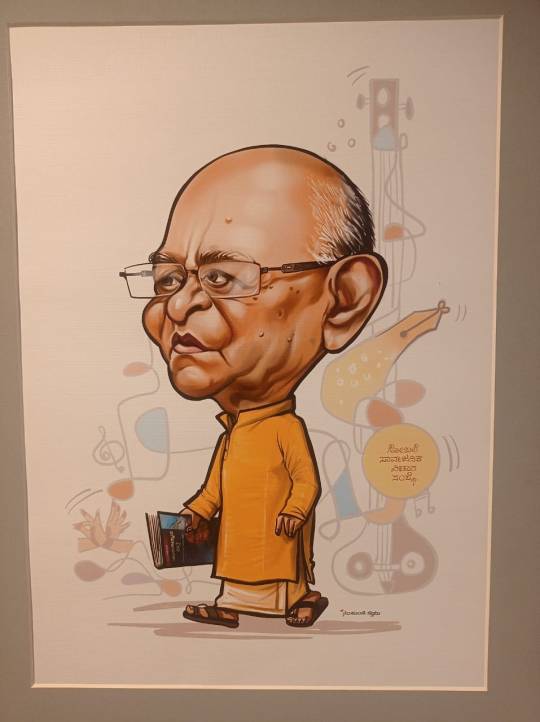
A few days after that, I was going to be on a long train to Pune and had taken the novel with me. Even before we crossed the Karnataka border, I had finished reading the novel and cursed myself for not having brought the other one too (which was a result of my underestimation of my own reading speed). As soon as I came back to Bangalore, I raced through the other novel. When I returned the two novels to SRR, he gave me more. It had been years since I had read fiction and given that my day job involves reading, writing, design, and publication, I had forgotten the art of reading for pleasure. This gesture on SRR's part rekindled that spark. The flipside was that I started finding films and web series tiresome!
I mostly read Jack Reacher novels this year and what fascinated me the most (besides the intricate plots, value conflicts, and the edge-of-the-seat twists and turns) was the universal appeal of a character like Reacher who lives like a monk and fights like a tiger; even in the materialistic West the allure of a man who is detached and driven by a strong sense of dharma is irresistible. And that gives me hope.
#
Soon I will hit forty. Probably my best years are behind me but I like to believe that they are yet to come. To augment this belief, I lay out my plans for 2024 before getting into my recollections of 2023.
I have three short-term goals, which I wish to complete in the next six months:
i. Organise my library
ii. Simplify my wardrobe
iii. Consolidate my finances
and four lifestyle goals that I wish to continue through the year:
1. Exercise daily
2. Read more, and more varied books
3. Play the violin more
4. Avoid sugar and fried foods at all costs
Some of the books in the pipeline for this year are: A R Krishnasastri’s Kathāmṛta, a new edition of Bhāsa’s Svapna-vāsavadatta, D V Gundappa’s Jīvana-dharma-yoga translated by Raghavendra Hebbalalu and Sreelalitha Rupanagudi, Volumes VII and VIII of DVG’s Art Gallery of Memories, S R Ramaswamy’s Silhouettes of Excellence, Sripriya Srinivasan’s book on Pallava history for high school students, minor poems of Nīlakaṇṭha-dīkṣita, and Jayadeva’s Gīta-govindam, among others.
I'm also working on a few exciting projects with cousin Dr. Chandra Shekhar (a short stories anthology), my college classmate Sudarshan K A (on financial wisdom), and with my friends Ganesh Bhat Koppalatota and Neelakanth Kulkarni (curating the best of Kannada literature), and I hope that at least a few of these see completion by end of the year.
#
I was lucky to have a front row seat as the following books unfolded through the course of the year: Three volumes of DVG's Kannada writings in translation (Contemporaries of Vidyaranya, his writings on the two epics of India, and an anthology of his essays on poetics), Vols. V and VI of the Art Gallery of Memories by DVG, Śatāvadhānī Dr. R Ganesh's Kṣāttra: The Tradition of Valour in India, and Dr. L Subramaniam's Festival Beyond Borders, among others.
I was able to facilitate the publication of three books by family members: my mother's booklet of life-lessons titled Song of my Soul, my father's monograph on The Amazing Human Mind, and my great-uncle (Late) Sri S Rangarajan's mammoth 648-page memoirs titled It Happens as Ordained.
The highlight, however, was a little book that I co-wrote with Dr. Ganesh titled The Essential Sanatana Dharma.

In addition to working on a few books in 2023, I was also invited to give lectures on a variety of topics, some of which were at the insistence of Dr. Arathi V B who has often magnanimously offered me opportunities that are far beyond my ken. If my calculations are right, I must have given no less than eighteen lectures this year. Friends like Madhulika Srivatsa, Sagar Mehta, and Vani Anur invited me to their homes to give lectures to their family and friends, which were highly rewarding.
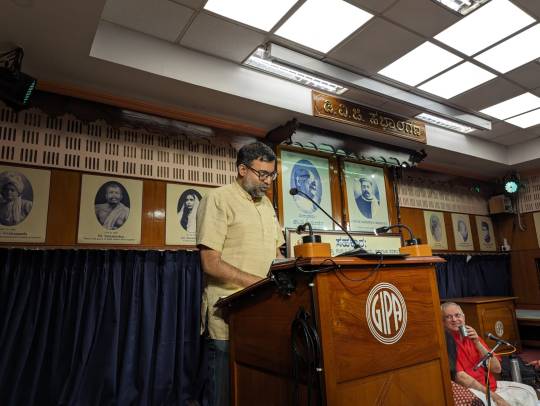
I had the singular fortune of addressing a large number of school children, teachers, young parents, devout Hindus, et al. on topics as varied as life skills to the essentials of Sanātana-dharma; from the importance of history and heritage to world musical genres (at an elders' enrichment centre); from Indian Knowledge Systems to the Art Gallery of Memories (series of lectures at the Gokhale Institute of Public Affairs); and on the Artha-śāstra, Mahābhārata, Bhagavad-gītā, and Śrīkṛṣṇa-karṇāmṛta.
#
For more than two decades I have been attending the Lakshminarayana Global Music Festival (LGMF) organised by my guru Dr. L Subramaniam (along with his wife, Smt. Kavita Krishnamurti, who is the director of the festival); for some years, I was also active in the organising committee of the festival. Each edition of the LGMF has been a historic event and 2023 was no different. The upcoming tour is no less exciting with a remarkable orchestra from Kazakhstan visiting India.
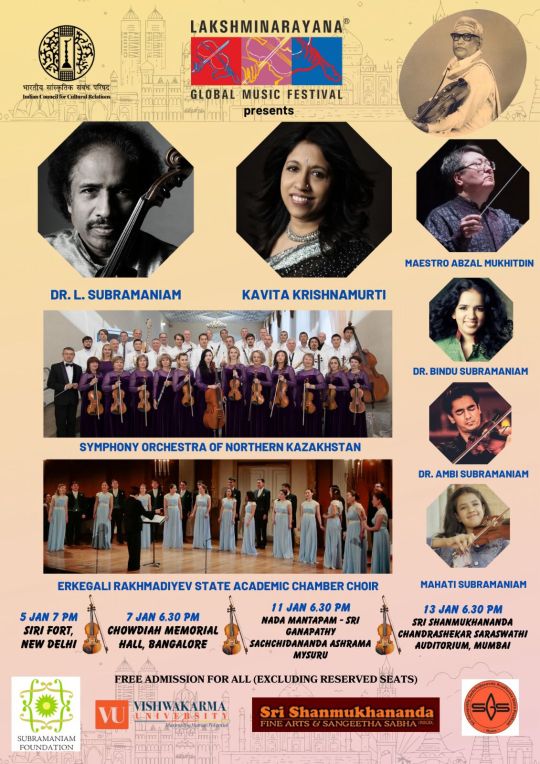
Some of the other memorable events that I attended in 2023 include the third edition of Madanotsava organised by my good friends Nirupama and Rajendra, the eightieth birthday celebrations of Dr. Padma Subrahmanyam organised by Drishti Arts Centre, the fifth World Coffee Conference (thanks to my friend Ananth Bhatt), and a lovely eighty-fifth birthday celebration of my great-uncle Sri R Vasudevan that included a superb concert by the musician-surgeon of our family, Dr. Mukund Jagannathan.
#
Despite some challenges, the home situation was stable. My mother and my grandmother moved to an apartment next to my place and my father and brother regularly visit. I became one of the Trustees of our family trust and that means greater opportunity to help the community. I have also been involved in some consolidation of my finances so that I won't have to worry about money after 2024. I echo the sentiments of Jack Reacher in Gone Tomorrow (2009) — “I'm a rich man. To have everything you need is the definition of affluence.”
#
There are times when our family and friends perform an unexpected act of kindness that leaves us fumbling for words. My grandmother's younger sister, Smt. Shanti Rangarajan, aged 89, made a trip all the way from Chennai to Bangalore (with her daughter Deepta) to spend time with my mother on her 66th birthday, given that she was just recovering from her surgery and was home-bound.

When I was in Mumbai earlier this year, I happened to ping my BMS College classmate Anshuman Borah, who emigrated to UK some years ago. He immediately wrote back saying that he was in Pune to sell his flat. I had been in Pune that very morning; distraught at having missed catching up with him, I called him up to berate him for not telling me earlier. He immediately said, "I'll come to Mumbai tomorrow. Just send me your location and I'll be there to pick you up." Sure enough, the next morning he took a taxi from Pune all the way to Mumbai just to meet me. We had a nice lunch and spent five or six hours before he took a taxi back to Pune. (And there were times in college when we have shared a jhal mudi costing Rs. 10 because we had run out of cash!)

Anu and Chandra (technically my mother's generation but more like friends/cousins to me) generously offered me a carte blanche to pursue whatever projects I wish to, without fretting about the monetary implications. Their gesture has inspired me to work even more towards a larger cause, especially in the fields of culture, literature, music, and education, which are of common interest to us.
Prof. L V Shanthakumari has been a mentor-guru-adopted grandmother to me and many other friends. Earlier this year, she was visiting her younger son Sri Niranjana who lives across the town from her, in faraway Marathahalli. Our ancestral house in Halasuru is almost the mid-point between her house and her son's house, so I requested LVS madam to consider visiting us for lunch. She graciously agreed and visited us with Niranjana, who incidentally lived in the same neighbourhood many years earlier! My family and I were thrilled to host LVS madam and we spent a lovely afternoon together.
My cousin Arun was slated to visit India in August along with my aunt and uncle. I was planning to borrow my father's car so that I could take Arun around. Right at that time, my good friend Chandrashekhar told me, "I just bought a new car and there's the old one languishing in my place. Just take it and use it for as long as you want." Thanks to Chandru, I was able to drive around Arun and later had reliable transportation for myself, especially during some of the busy months of the year. After relying on public transport for more than a year, this came as a real boon.
#
My good friend Arjun Bharadwaj always teases me of excessively indulging in what he playfully dubs "Eating-Outing-Meeting." While I am an introvert by temperament, I often step out for these E-O-Ms for a dose of enrichment. Outside of my books and my music, I find nothing more enjoyable than a meaningful conversation with friends and savants.
It has been my great fortune to have come in contact with so many greats of our time—and in some cases, even dine with them and travel with them.
One of our Saturday morning meet-ups took place on Church Street with SRR taking us (Vighneshwar Bhat, Sandeep Balakrishna, Arjun Bharadwaj, and me) to Select Book Shop, which was started by a friend of his. Later he took us out to lunch and simply refused to let any of us pay.
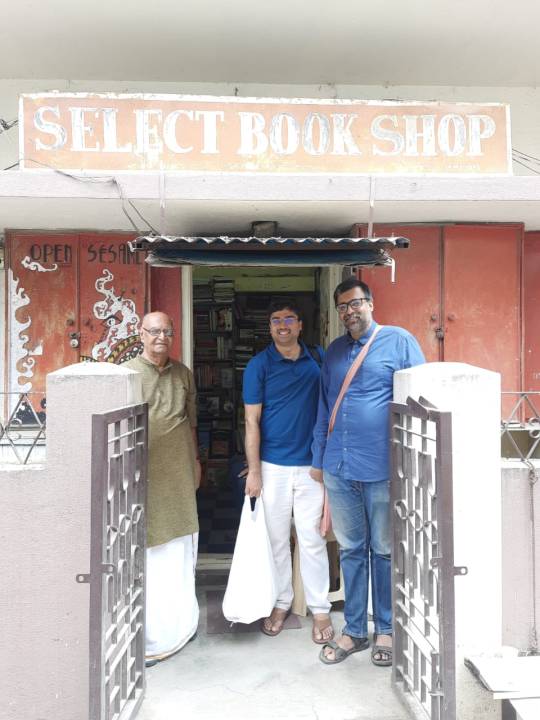
Ambi (my uncle, Dr. Koti Sreekrishna) visited India earlier this year and even stayed with me for a few days. I had a great time with him, discussing everything from the ridiculous to the sublime—often through the course of a meal in a nearby restaurant. I also had the chance to drag two of my friends (Arjun and GS) to meet Ambi and his elder brother Kanna (my uncle, Sri K Srinivas) at their ancestral house. The conversations, mostly revolving around the the great epics of India, were memorable (with some of it secretly captured on video and clandestinely posted on Facebook by Ambi).

My cousin Arun visited India in August and stayed with me. It had been years since we had met and there was so much to talk about. It was really inspiring to see his focus and his ability to grasp new ideas. I introduced him to a bunch of my friends and we all had a memorable time. Cousin Anita could not visit and was sorely missed, but she had just had a baby (my second nephew, Jayanth).
Arjun and I visited Mysore to meet Dr. S L Bhyrappa, who graciously invited us to lunch with him. Following that, we proceeded to Pandavapura to meet Mr. Anke Gowda, who has the largest personal collection of books that I have seen (over 1 million books). We were thrilled to visit his library as he enthusiastically showed us around. He has been collecting books for some seven decades with his meagre salary, driven by intense passion and devotion to literature.

Through the course of the year, in addition to the regular meet-ups with my friends, gurus, and family, I had the opportunity to meet a host of interesting people: Sri Prafulla Ketkar (Chief Editor, Organiser), Sri Shivaswami (Bhagavad-gītā scholar), Dr. Manohar Shinde (Founder, Dharma Civilization Foundation), Dr. Shekhar Borgaonkar (my father's college classmate and old friend), Dr. Kanniks Kannikeswaran (musician-composer-educator), and the dedicated people who run Rashtrotthana Vidya Kendra at Hagaribommanahalli, among others.
#
It is a co-incidence that the year began with a trip to Ellora and just as 2023 came to an end, during the course of our Madhya Pradesh road-trip, the first destination was Ellora. It was wonderful to visit that puṇya-kṣetra twice in a calendar year.
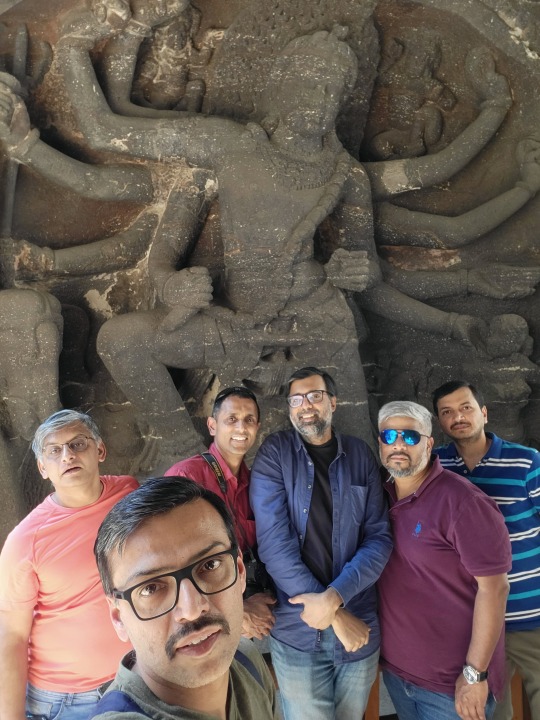
In addition to visiting Solapur, Sambhajinagar, Pune, Mumbai, Karwar, and Chennai, I went to Valparai (Tamil Nadu) for our annual boys' trip, with more friends joining the fray:
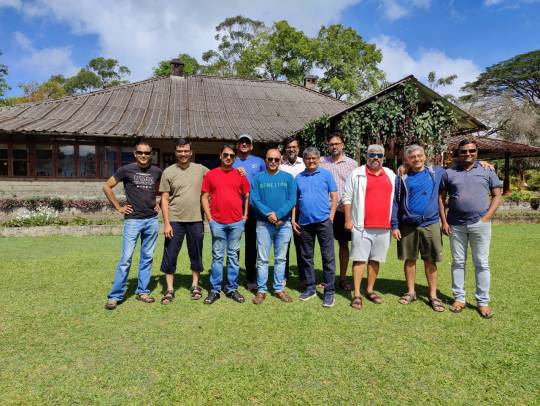
I spent the last days of the year on the road: traversing 3,800+ kilometres (Bangalore-Ellora-Maheshwar-Indore-Ujjain-Vidisha/Sanchi-Udayapur-Khajuraho-Bedaghat-Bangalore) in nine days with five of my friends and a shoe-string budget.

Among the many highlights of the trip was visiting Ahalyabai Holkar Smarak at Maheshwar.

To see her humble dwelling and to contrast that with her unparalleled achievements was an inspiration. These are the real heroes of our land and it is a sin to forget them.
#
Sri C R Sathya, the grandson of Prof. A R Krishnasastri and a remarkable space scientist (and writer) in his own right died earlier this year. He had been a great support during the time I co-translated The Essential Mahabharata. Not many people know that the gentleman on the right side of this iconic photo by Henri Cartier-Bresson is C R Sathya:

A few other greats who breathed their last in 2023 include Sri Siddeshwar Swamiji; the great gamaki Sri Chandrashekar Kedilaya; Wayne Shorter, the legendary jazz saxophonist; Sri B K S Varma, the painter par excellence; and iconic filmmaker Sri K Viswanath. I had the great fortune of meeting and interacting with both B K S Varma and K Viswanath some years ago.
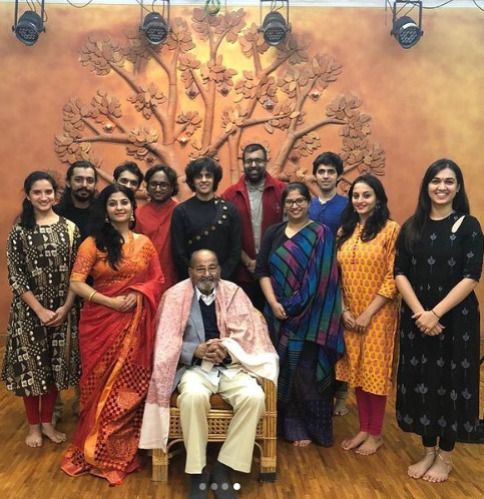
#
The changes around us end up affecting us in some way, directly or indirectly, unless of course we are really cut off and have isolated ourselves from society. In this vein, it might be instructive to broadly look at some of the events from 2023.
India has marched forward under the visionary leadership of Sri Narendra Modi, who has never failed to impress with his tireless striving for a better future.
India is now the most populous country with a host of internal problems, largely fuelled by predatory ideologies, be it the clashes between the Kuki and the Meitei or the Nuh violence or even the denigration of Sanātana-dharma, which is the most inclusive religio-philosophical system in the world. Despite this and some of the self-inflicted wounds to the economy, the country witnessed the manner in which challenges were masterfully met, be it the organisation of the spectacular G20 or the rescue of 41 miners trapped in the Uttarakashi tunnel, be it seamlessly shifting to the new parliament building or sending Chandrayaan III to the moon.
After the demonic attack that took place on October 7th, 2023, the world is slowly realising the danger of the bloodthirsty death cult masquerading as a religion. More and more countries are rejecting the pseudo-liberal ideologies of the left and are instead moving far right, which is also dangerous in its own way. Coupled with this, we are unsure of the impact of Artificial Intelligence on the future of humans. And somewhere amidst all this chaos, unknown men are quietly doing their work. And that brings me a great deal of peace.
#
Thanks for reading this far, and with this I wish you and your family a wonderful new year! I hope it will be filled with joy, good health, prosperity, and moments to cherish. May your dreams come true!
—
Appendix
I wish to share some of the fantastic accomplishments of a few people in my circle. It is, as always, an ad hoc list that I have prepared on the spur of the moment. I might have missed out some but those that I have listed are certainly notable:
Brahmin Genocide is an important topic researched by Sri Balaji Mahalingam (who writes under the pseudonym Asi) that brings to the fore an injustice that has pervaded our society in the last couple of centuries and must be immediately rectified if Hinduism is to survive. The first edition of the book was sold out in just a few months and he is now working on the second edition.
The seventh century CE Sanskrit play Bhagavad-ajjukam was documented by Nirupama and Rajendra with support from Sudha Murty, Śatāvadhānī Dr. R Ganesh, Praveen D Rao, Arjun Bharadwaj, et al.—see the Introduction and the complete play (with subtitles).
Bhāratīya Kṣāttra Paramparā (Hindi translation by Prof. Dharmaraj Singh Vaghela)
Earlier this year, when the book Kṣāttra was released, I gave a copy of the book to my uncle Prof. Vaghela. The very next day, he called me and said that it is an important book which must reach the Hindi heartland and offered to translate it into Hindi. Dr. Ganesh immediately gave his consent. In a matter of months, he finished the translation, which is now appearing on www.prekshaa.in as a series and will soon be published in book form.
My good friend and former colleague Arjun Bharadwaj has come out with two remarkable books this year: the first, titled Nayana-Savana (co-written with Śatāvadhānī Dr. R Ganesh), which is a creative appreciation of some of the major productions of the legendary Dr. Padma Subrahmanyam and the second, titled Indian Perspective of Truth and Beauty in Homer’s Epics, which is worthy of a D.Litt. no less.
S R Ramaswamy's latest work titled Sāhitya Sānnihitya is an anthology of book reviews and writings on literature.
Saṃskṛti is a reprint of a charming little book on culture with essays by littérateurs including Devudu Narasimha Shastri, A N Murthy Rao, A N Krishna Rao, Masti Venkatesha Iyengar, and C K Venkataramayya.
Prekshaa Pratishtana has brought out a lovely introductory video that summarises its vision and objectives. They continue to publish many books every year and maintain an ad-free online journal (www.prekshaa.in) with authentic content on Indian heritage for one and all.
My cousin Arun Prasad continues to do remarkable work with Ambuda, the online digital library for Sanskrit.
The best of Śatāvadhānī Dr. R Ganesh's writings in Kannada have been compiled in two volumes with the title Rāga-bhāratī.
Dr. G Sudesh Kumar, a close family friend, recently authored a coffee-table book titled History of Sri Parakala Mutt.

2 notes
·
View notes
Text
queer short film: "the kinnaras of the dark world"
queer short cuts is a biweekly newsletter where i share queer & trans short film recommendations. i’m featuring some of my favorite films on tumblr because why not
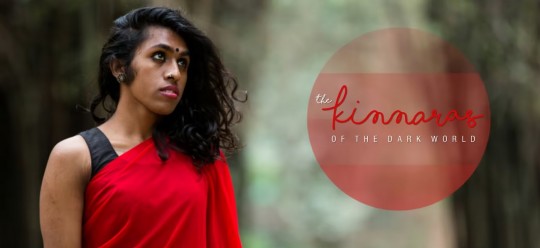
india | 5 minutes | 2018 | experimental film/visual poetry/dance film
audio in kannada; english subtitles embedded
the kinnaras of the dark world is a beautiful visual poem and dance video by trans performer, poet, journalist, radio jockey, and activist shilok mukkati. the poem depicts the harm and ostracization shilok has faced for being transfeminine and kinnar, a self-adopted term for third gender folks in certain parts of india; the name kinnara comes from a mythological creature in hinduism and buddhism that is strongly associated with music and love. but despite the pain of enduring oppression, being kinnar is also freedom for shilok, helping her rise and claim her own power.
- deepa's full review, including content notes at the end
watch on vimeo, and find creator shilok mukkati on instagram!
#queer short cuts#queer film#trans film#indian queer film#experimental film#visual poetry#dance film#short films#film recommendations#shilok mukkati
3 notes
·
View notes
Text
One man school orchestra presented by the emperor of educational arts Ashuhosadurgasadhaniya Mariyammanjanadi Mangalore (D.K):- This is the only school program known as the first entertainment to follow the school curriculum. This one man school orchestra, in this program, one artist, from 1st standard to 10th standard (SSLC,PUC,BA, Art's) STAT, CBSC ,ICSC, Syllabus, Ka Maggi will be sung in English and Kannada, entertaining song style, and also, Tamil, Telugu, Malayalam, Urdu, Marathi, Punjabi, others. Folk, devotional song, emotional song, DJ music, movie karaoke song, composition, poems will be sung, and magic show, revealed and explained. This is a perfect school entertainment program without fail, conduct this one man school orchestra (teachers/school administration board president, members For more information:- Call mobile number 93431-93431, Thank you. According to the number of students, Sounds 100 Whats for 100 students, 250 Whats for students, 300 Whats for students, 500 Whats for students, 1000 Whats for students, 1000 Whats for students will be sent without fail, more students participate in the program and less whats sounds will not listen to the program. It is hereby informed that more attention should be paid in this matter.
0 notes
Text
Story of mother Seeta in Kannada: Kannada story symbol of love, courage and loyalty!Mother Seeta has the most important divinity in Hindu mythology. His role in Ramayana is important privately.Mother Seetamatha was the daughter of Mithila king and Sunaina Devi. She is called Janaki.According to Ramayana, Ram, the seventh incarnation of Lord Vishnu, got married as Seetamata's husband, and then she got married as a result of drinking Shiva's divine bow and fighting.When they went to help Rama in exile, the devil king named Ravana took her away, which started the fight between Rama and Ravana.During Ravana's invasion, she became famous for her love and trust between Mother Seeta and Rama. She refused to marry against Ravana's attack.She was tested fire to authenticate her purity. There she came out of nothing, her purity was certified by this incident.It has been found that the inhumane person seen to Rama is an important person due to the love of Mother Seeta.Seetamata is very loved by various poems in Kannada imagination.Kannada films, dramas, serials and films are good examples for Seetamata's story list.Introduction of Seetamata is described in different Kannada literature works.Her portrait is famous in many forms in Kannada literature.She has guided devotees through religion, compassion, and selfless devotion.The worship of Mother Sita is a proud moment for child's happiness, wealth, and the response of Durga culprits.Pictures of Ram and Seetamata are worshipped during the important worship of Mother Seetamata.The one who sees Sakshat Narayana in the role of Sita Mata is proudly considered to the devotees.Seetamata's story is described in several poems in various Kannada literary forms.Kannadigas show adoration to the extraordinary love and trust of Mother Seeta.The story of mother Sitamata is the reason to form the rules and guidance of society.Her constant sincerity in her lyrics are shown by the signatures that presented.Seetamata's exile along with Rama and Lakshmana describes the suffering and courage of exile.Mother Sita's capability in times of crisis gives people courage.The illegal path of her opponent Ravana describes the message of religion.Although the story of Ramayana is famous through many films, Kannada movies have shown it well.The story of mother Sita is a story of devotion, faith and courage.
View On WordPress
0 notes
Text
166th Kannada poem filmed at Altare della Patria (Vittoriano) in Roma, Italia
Always fun to take Kannada poetry beyond the borders of Karnataka!
This poem is about a horse, by S. Manjunath, a man who died young, a man through whom a lot more poetry would have happened to us were he alive for a few more years. His free verse is so magnificent that in its depth and wonder that it can move purists of poetry who rant about strict metres, to silence. Our small tribute to a…
youtube
View On WordPress
#Altar of the Fatherland#Altare della Patria#Europe#Italia#italy#Kannada#Kannada Poems#Kannada Poetry#Padayaatre#Padayaatre in Europe#Padayaatre YouTube Channel#poems#poetry#Roma#Rome#Videos#Vittoriano#Words#words matter#Youtube
0 notes
Text
Madhuri Kulkarni is a teacher by profession and an author by passion. She is from Bangalore, the Silicon city of India. Her writing journey started in 1981 when she was in 8th grade. She writes in Kannada as well as English languages. She confesses she not a systematic writer and writes what pleases her.. Her book MUSINGS OF MY SOUL published by KASHMIRA PURAVASINI PUBLICATIONS was recently launched.
Talkative by nature, she wishes to spread love and positivity....
She has co-authored ten international anthologies and few Kannada anthologies as well. She is a regular writer for International magazine Poetry Planet, Philippines. Her Kannada poems have been translated into Spanish language and one English poem into Sinhalese language.
She loves writing, reading, travelling and gardening. Making best out of waste is her favourite hobby.
MUSINGS OF MY SOUL
(Author: Madhuri Kulkarni
Publisher: Kashmira Puravasini Publications)
The book Musings of my Soul is written by Madhuri
Kulkarni and published by Kashmira Puravasini Publications.
It is a book written under different sections..like My Musings, Favourites, Relationships and Introspection..In My Musings we see that the poet sees the butterfly and talks to her, or the lone bench/creaky old gate and how it shares it's experiences..In the Relationships section we can see the chemistry with the parents, siblings, friends, the thoughts,actions and affection they share...in the favourites section we can find poems about what the poet loves to write about.. be it Krishna, Tea, Radha. as so on.In the Introspection section.. the poems are based on the inner feelings, turmoil which a person undergoes...Overall.the book gives the pleasure of being yourself while reading it.
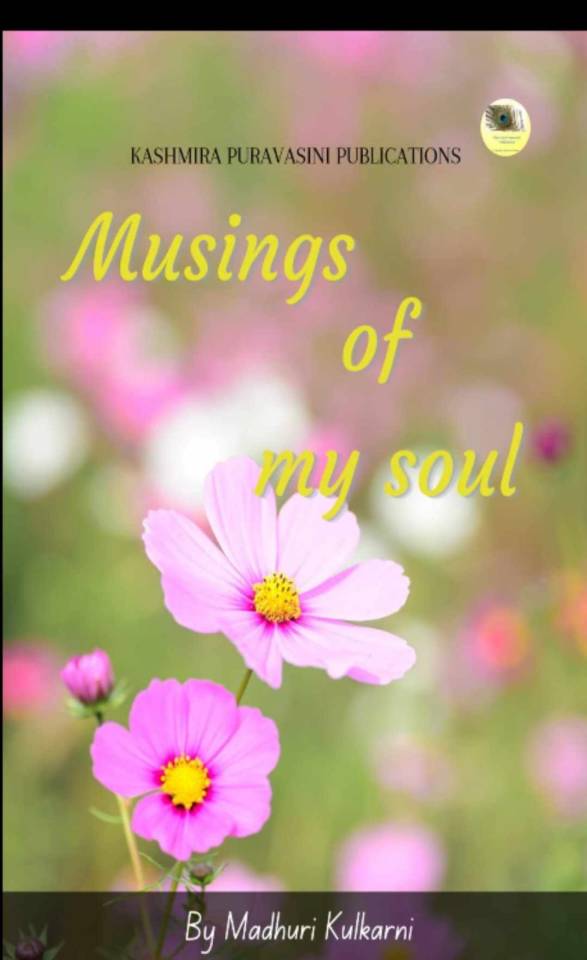
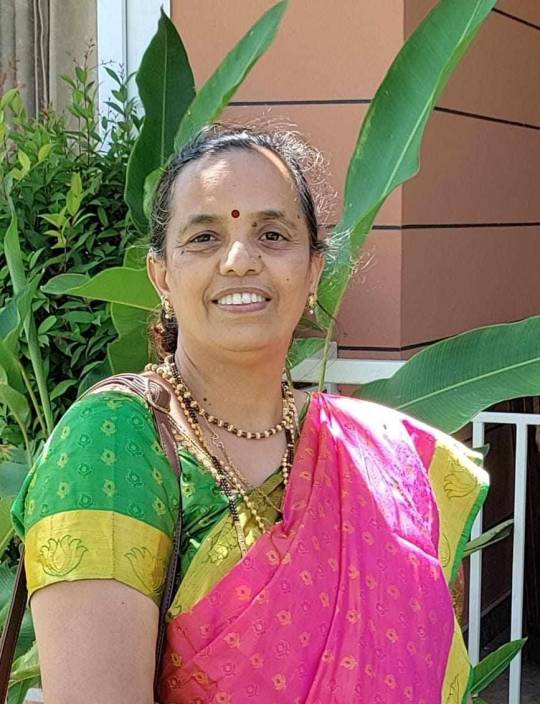
0 notes
Text
Watching as the world burns, I often find myself guilty while thinking of the love and appreciation that I still have for people and the world. Today, I was fortunate to be able to hear the words of the Kannada poet Manjula Hulikunte, whose poem I am sharing here, I am in awe of how much it spoke to me.
Love in the times of Nationalism
Manjula Hulikunte
I write poems of love
while the nation is burning.
This might anger a lot many…
What is wrong?
I write poems about spreading light
amidst people who set fire.
The day love flowers in every heart
I will certainly write about the nation.
Until then
let my words be reserved for poems on love and separation.
May I not be filled with the maddening nationalism
that takes wings only before the corpses.
Let my words not be at the service of
a nationalism that is valued more than
the blood of a poor man
a nationalism that feeds itself
by humiliating humans.
I dream and speak only of
a country whose heart is filled with love.
0 notes
Text
Department of Languages: Conversation with Department Head, Dr.Trapthy Sharma
Language has always been a medium to convey messages or emotions in a way that makes it easy for others to understand what a person might be feeling or thinking. The best poems and greatest stories remain unknown, hidden within famous yet unread course books.The appreciation for language appears to have declined over the years, leading to a decrease in the prominence of language departments in degree colleges.
We sat down with Dr.Trapthy Sharma, the head of the Language Department here at ST PAULS COLLEGE, Bangalore. Ma’am has been a part of the ST PAULS family since the institution’s beginning phase.
From faculty member to department head, her journey has involved many hellos and goodbyes from countless students. She has always felt proud of the students who learned a language under her care and guidance. She has consistently strived to bring out the best of their potential.
The Language Department fosters a symbiotic relationship with its students. The college offers more than 12 languages, including Hindi (taught by Ma’am herself), English, Kannada, Malayalam, and Urdu.
During our conversation, Dr.Trapthy mentioned that a lot has changed since her time as a student. Students today have a much heavier workload than she did. There has been a shift towards extracurricular activities in recent years. Students are exposed to many responsibilities beyond their coursework, and this has demonstrably brought a positive change. They act more maturely and handle pressure better.
While discussing extracurricular activities, we asked Ma’am about the fests organized by the Language Department. Dr.Trapthy has taken many initiatives to ensure students experience different cultures and languages through these college fests. The primary purpose of these events is to introduce students to new cultures and languages. Secondly, they provide a platform for students to showcase not only their talents but also their roots and traditions in a fun and educational way. The well-planned events help students get familiar with their peers and faculty members.
Ma’am also emphasized the importance of understanding language concepts. She stressed that without a good grasp of language, we are incapable of accurately conveying our feelings, which can hinder our long-term goals. According to her, the first step towards growth comes from knowing the language of the place you live. This understanding is essential for comprehending the important aspects of the culture. It fosters empathy and creates a special bond built on respect for each other’s efforts.
During the conversation, she also made a very relevant point for the current times: the value of a language degree. People often view language as a side subject or an additional course, which undermines its importance in any field of work. Media, Law, Advertising, Psychology, IT, Corporate – regardless of the field, language can be a significant barrier. Studying a language course equips one with a strong grasp of the subject itself. It provides the crucial ability to articulate thoughts clearly under any circumstance.
As per Dr.Trapthy’s view, language is not only important for initiating a conversation but also for keeping it going. This applies to conveying news, knowledge, stories, or speeches. Fluency and a strong command of language boost confidence and bring greater attention to your work.
As our session concluded, we asked Ma’am to leave a message for students pursuing their dreams to become professionals or are about to enter that phase of their life. Here’s what Dr.Trapthy said: “Students are like statues made out of a lot of love and care. But a plain statue wouldn’t hold someone’s attention for long. The need to decorate a statue comes from the desire to be seen and noticed. The same applies to students. As language and grammar are the basic foundation of our society, it’s important for students to adorn themselves with as much knowledge and as many languages as they can. When they go out into the world, people will be instantly drawn to them. The more they learn, the more they’ll grow.”
That’s all from us. This is the ST PAULS Team, signing off until next time. Stay safe, keep achieving, and keep dreaming.
Learn more about BA courses and specializationsat ST PAULS COLLEGE, Bengaluru.
0 notes
Text
Cultural Fusion: Transforming Narratives with English to Kannada Translation
As the world becomes more linked, people from different countries can share their thoughts and stories. Translation, which connects people from different countries and languages, is an important part of this exchange. English to Kannada translation is more than just changing words. It’s also about combining cultures in a way that gives stories new meaning.
The Power of Kannada Literature
Kannada is a Dravidian language that has a rich cultural history. It is spoken by over 43 million people, mostly in the Indian state of Karnataka. Kannada literature gives a special look into Indian culture, history, and philosophy. From the great poems of Pampa and Ranna to the moving stories of Kannada Sahitya Akademi winners, there is a lot to discover.
But it can be hard for people who don’t speak Kannada to get to this wealth of information. This is where translation comes in. It connects different cultures so that Kannada stories can be understood by more people.
The Art of Transformation: Beyond Literal Meaning
English to Kannada translation is more than just getting the closest word that means the same thing. A good translator knows how to deal with the subtleties of both languages to make sure that the translated text stays true to the original story. Among these are:
Cultural References: There are a lot of cultural connections in English writing that might not make sense to people who read Kannada. A good translator can spot these connections and find regionally appropriate words that still mean the same thing.
Idioms and Proverbs: When you translate idioms and proverbs word-for-word, you can end up with words that don’t make sense. A good translator can find Kannada sayings or proverbs that mean the same thing and make you feel the same way.
Humor and Wordplay: Often, humor is unique to a certain culture. English jokes and humor might not work the same way in Kannada. The translator has to think of creative ways to keep the humor’s essence for people who speak Kannada.
The Impact of Translation: A Two-Way Street
There are many good things about translating from English to Kannada. It lets Kannada writing reach people all over the world, which helps people understand and appreciate other cultures. It also adds to the body of Kannada literature by bringing in fresh thoughts and points of view.
Translation, on the other hand, goes both ways. People around the world can enjoy the beauty and depth of Kannada writing by having works translated into English. This can make people want to learn Kannada and learn more about its rich culture history.
Examples of Transformation: When Translation Brings Stories Alive
Here are some examples of how translating stories from English to Kannada can change them:
Translating Classics: Malgudi Days by R.K. Narayan is a classic story about Indian life that can be turned into Kannada so that a new generation of Kannada readers can connect with these stories.
Modern Literature: Modern English literature, with its wide range of topics and writing styles, can be turned into Kannada. This will make the local literary scene stronger and give Kannada readers new ways to enjoy stories.
Children’s Literature: Kids can learn to love reading and discover new places by translating children’s books into Kannada.
Looking Ahead: The Future of English to Kannada Translation
Translation from English to Kannada has a bright future ahead of it. As Kannada writing becomes more famous and people want to learn about other cultures, translators will play an even more important role.
THE FUTURE COULD BE FULL OF THESE EXCITING THINGS:
Machine Translation Advancements: Translation tools are getting better, which can help people read works that have been translated between English and Kannada. But human knowledge will still be needed to make sure that the original text is culturally accurate and retains its artistic value.
Digital Platforms: As digital platforms like e-books and podcasts become more popular, they open up new ways to share translated works with more Kannada readers.
In conclusion
English to Kannada translation is more than just a technical task; it’s a mix of cultures that lets stories reach people who don’t speak the same language. Translators are very important for promoting international understanding and improving the literature environment of both languages because they keep the core of the original story while changing it to a new culture setting.
Source: https://translationwala.wordpress.com/2024/03/11/cultural-fusion-transforming-narratives-with-english-to-kannada-translation/
#English to Kannada translation#English to Kannada#Kannada translation#English to Kannada translation online
0 notes
Text
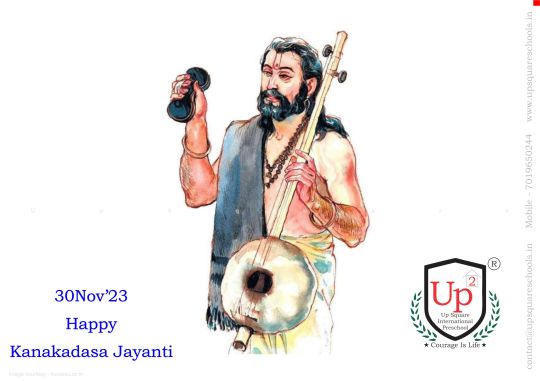
Best Preschool in Electronic City
UP Square International Preschool
www.upsquareschools.in
Subject - KanakadasaJayanthi
KanakadasaJayanthi is celebrated on 30th November this year. Kanakadasa was a renowned composer of Carnatic music, poet, philosopher and musician. He is known for his keertanas (Hymns) and ugabhoga(physiological ideas) compositions in kannada language.
One of his famous poem is " Kula Kulakulavenduhodedhadadiri" meaning asks human not to segregate themselves from one another, because every human is born the same way, everyone eats the same food and drinks same water hence none is superior or inferior to one another.
Apart from making a remarkable contribution to Kannada literature ,Kanakadasa initiated the process of social philosophy to spread a message of equality in language which was accessible to all.
With Best Regards,
UP Square.
0 notes